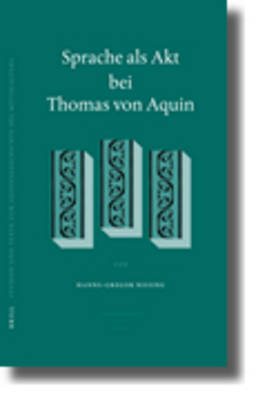
Sprache als Akt bei Thomas von Aquin
Brill (Verlag)
978-90-04-14645-7 (ISBN)
- Titel ist leider vergriffen;
keine Neuauflage - Artikel merken
This study offers a comprehensive survey of the philosophy of language of Thomas Aquinas. Inside an anthropological framework, the acts of reason are understood as principles of language, with the act of judgement occupying a central place. Since reason discerns truth it is the basis for the differentiation of speech acts as well as for analysis of the concluding act of reason which progresses from the known to the unknown. It is oriented towards the acquisition and the communication of knowledge, in its paradigmatic form of demonstration as well as in the various forms of rhetorical and poetic speech. Thus, Thomas’s philosophy of language reaches its final goal in a theory of teaching and learning.
Hanns-Gregor Nissing, 1996 diploma in Roman Catholic theology at the University of Münster, 2005 Ph.D. in Philosophy at the University of Bonn. Since 2005 he is Head of division for Theology and Philosophy at the Thomas-Morus-Akademie Bensberg (Catholic Academy in the archbishopric of Cologne).
Vorwort .. xv
Einleitung .. 1
1. Zur Forschungslage .. 10
2. Die These der vorliegenden Interpretation .. 19
3. Zu Methode und Aufbau der Arbeit .. 23
TEIL I: ,VERBUM VOCIS‘ UND ,ACTUS RATIONIS‘: DIE SPRACHE UND IHRE PRINZIPIEN
Einführung .. 35
Kapitel 1: Zum Ursprung der Sprache: Der Mensch als ,animal rationale‘ und ,animal sociale‘ .. 40
Kapitel 2: Das Äussere Sprachphänomen (,vox‘): Ausdruck und Zeichen .. 70
Kapitel 3: Die inneren Voraussetzungen der sprachlichen Äusserung .. 111
TEIL II: ,VERITAS‘ UND ,IUDICIUM‘: DIE ZWEITE TÄTIGKEIT DES VERSTANDES ALS FORMALE BASIS UND ANGELPUNKT MENSCHLICHEN SPRECHENS
Einführung .. 251
Kapitel 4: Das Urteil (,iudicium‘) als Träger von Wahrheit oder Falschheit .. 257
Kapitel 5: Der sprachliche Ausdruck des Urteils: Die Aussage (,enunciatio‘) und ihre Eigenschaften .. 341
Kapitel 6: Der Akt des Urteilens als Grundlage für eine ,Theorie der Sprechakte‘ .. 447
TEIL III: ,DEMONSTRATIO‘ UND DOCTRINA: DIE DRITTE TÄTIGKEIT DER ERNUNFT UND DAS UMFASSENDE ZIEL MENSCHLICHEN SPRECHENS
Einführung .. 491
Kapitel 7: Vom Bekannten zum Unbekannten: Die beweisende Schlußfolgerung (,syllogismus demonstrativus‘) als Bewegung der Vernunft (,processus rationis‘) .. 500
Kapitel 8: ,Demonstratio‘ als Paradigma: Die beweisende Schlußfolgerung und der Erkenntnisfortschritt .. 537
Kapitel 9: Die Einordnung der dritten Vernunfttätigkeit in die kommunikative Situation des Lehrens und Lernens .. 671
Abkürzungsverzeichnis .. 743
Literaturverzeichnis .. 747
Register ..
1. Stellenregister
2. Namensregister
3. Sachregister
| Erscheint lt. Verlag | 29.11.2005 |
|---|---|
| Reihe/Serie | Studien und Texte zur Geistesgeschichte des Mittelalters ; 87 |
| Verlagsort | Leiden |
| Sprache | deutsch |
| Gewicht | 1635 g |
| Themenwelt | Geisteswissenschaften ► Philosophie ► Sprachphilosophie |
| ISBN-10 | 90-04-14645-8 / 9004146458 |
| ISBN-13 | 978-90-04-14645-7 / 9789004146457 |
| Zustand | Neuware |
| Haben Sie eine Frage zum Produkt? |
aus dem Bereich


